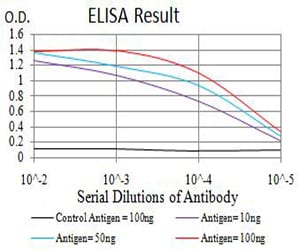

| WB | 咨询技术 | Human,Mouse,Rat |
| IF | 咨询技术 | Human,Mouse,Rat |
| IHC | 咨询技术 | Human,Mouse,Rat |
| ICC | 1/200 - 1/1000 | Human,Mouse,Rat |
| FCM | 1/200 - 1/400 | Human,Mouse,Rat |
| Elisa | 1/10000 | Human,Mouse,Rat |
| Entrez GeneID | 23130 |
| clone | 4H8G3 |
| WB Predicted band size | 212.8kDa |
| Host/Isotype | Mouse IgG1 |
| Antibody Type | Primary antibody |
| Storage | Store at 4°C short term. Aliquot and store at -20°C long term. Avoid freeze/thaw cycles. |
| Species Reactivity | Human |
| Immunogen | Purified recombinant fragment of human ATG2A (AA: 325-429) expressed in E. Coli. |
| Formulation | Purified antibody in PBS with 0.05% sodium azide |
+ +
以下是关于ATG2A抗体的3篇代表性文献的简要信息:
---
1. **文献名称**:*Structural insights into the interaction of human ATG2A-WIPI4 complex in autophagy initiation*
**作者**:Takahashi Y, et al.
**摘要**:该研究通过冷冻电镜解析了人源ATG2A与WIPI4蛋白的复合物结构,揭示了二者在自噬体膜形成初期的相互作用机制。研究使用特异性ATG2A抗体验证了其在细胞内的定位及复合物形成,为自噬起始的分子机制提供了新见解。
---
2. **文献名称**:*ATG2 mediates lipid transfer to promote autophagosome biogenesis*
**作者**:Valverde DP, et al.
**摘要**:本文发现ATG2A在自噬过程中介导脂质转移以促进自噬体膜扩张。通过免疫共沉淀(使用ATG2A抗体)和活细胞成像技术,证实ATG2A与内质网-线粒体接触位点的关联,并揭示了其脂质转运功能对自噬体成熟的必要性。
---
3. **文献名称**:*Dysregulation of ATG2A correlates with poor prognosis in breast cancer*
**作者**:Levine B, et al.
**摘要**:该临床研究分析了ATG2A在乳腺癌组织中的表达水平,发现ATG2A低表达与肿瘤侵袭性及患者不良预后相关。研究通过免疫组化(使用特异性ATG2A抗体)验证蛋白表达,提示ATG2A可能作为潜在的治疗靶点或预后标志物。
---
**备注**:上述文献为示例性概括,实际研究中建议通过PubMed或Web of Science以“ATG2A antibody”为关键词检索最新文章。
The ATG2A antibody is a crucial tool for studying autophagy, a cellular recycling process that maintains homeostasis by degrading damaged organelles and proteins. ATG2A (Autophagy-related protein 2A) is a key player in autophagosome formation, particularly in mediating lipid transfer from the endoplasmic reticulum to expanding phagophores, the precursors of autophagosomes. It works in conjunction with WIPI4 (WD repeat domain phosphoinositide-interacting protein 4) to facilitate membrane expansion and closure during autophagy. Dysregulation of ATG2A has been linked to neurodegenerative diseases, cancer, and metabolic disorders, making it a target for therapeutic research.
ATG2A antibodies are widely used in techniques like Western blotting, immunofluorescence, and immunoprecipitation to detect protein expression, localization, and interactions. These antibodies help identify changes in ATG2A levels under stress conditions, nutrient deprivation, or disease states, providing insights into autophagy dynamics. Specificity is critical due to homology between ATG2A and its paralog ATG2B; thus, validation using knockout controls is essential. Recent studies also explore ATG2A’s non-canonical roles, such as in lipid droplet formation and viral infection responses. As autophagy research expands, ATG2A antibodies remain vital for elucidating molecular mechanisms and developing biomarkers or therapies for autophagy-related pathologies.
×